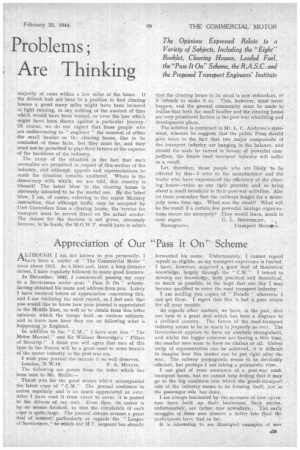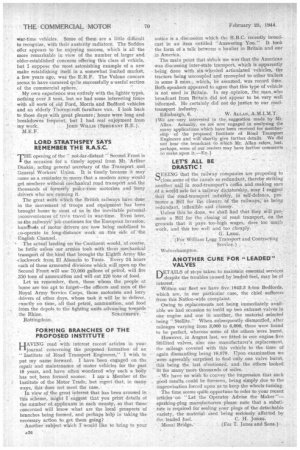Appreciation of Our "Pass It On" Scheme
Page 27

Page 28

If you've noticed an error in this article please click here to report it so we can fix it.
ALTH-OUGH I am not known to you personally, I have been a reader of " The Commercial Motor " since about 1912. As a fitter and, later, a long-distance driver, I have regularly followed its many good features.
In December, 1942, I commenced passing my copy to a Serviceman under your " Pass It On " scheme, having obtained his name and address from you. Lately I have received letters of appreciation concerning this, and I am enclosing the most recent, as I feel 'sure that you would like to know how your journal is appreciated in the Middle East, as well as to obtain from this letter opinions which the troops hold, on various subjects, and to learn how keen they are on following what is happening ju England.
In addition to the ," C.V.," I have sent him ." The Motor Manual," and Sir William Beveridge's " Pillars of Security." I think you will agree that men of this type in the Forces will be a great asset to some branch of the motor industry in the post-war era.
I wish your journal the succesi it so well deserves.
London, N.W.10. F. A. MULLIS. The following are points front the letter which has been sent to Mr, Mullis:— Thank you for the good wishes which accompanied the latest copy of " C.M." The journal continues to arrive regularly and is as much appreciated as ever. After I have read it from cover to cover, it is pased to the drivers of my unit. Even then, its, career is by no means finished, 50 that, the circulation ofeach copy is quite large. The journal always arouses a great deal of interest, particularly as regards the " League of Servicemen," to which our M.T. sergeant has already
forwarded his name. Unfortunately, I cannot regard myself as eligible, as my transport experience is limited. I have, however, acquired a good deal of theoretical knowledge, largely through the " C.M." I intend to develop my knowledge, both practical and theoretical, as much as possible, in the hope that one day I may become qualified to enter the road transport industry. am sending you copies of " Parade" whenever I can get them. I regret that this is but a poor return for all your trouble.
As.regards other matters, we have, in the past, shut our eyes to a great deal which has been a disgrace to a civilized country. The future of the road-transport industry seems to be as much in jeopardy as ever. The Government appears to have an absolute stranglehold, and whilst the bigger concerns are having a thin time, the smaller men seem to have no chince at all. Unless unity of representation can be achieved, it is difficult to imagine how this matter can be put right after the war. The railway propaganda seems to be devilishly -efficient, but perhaps I am taking a pessimistic view.
I am glad of your assurance of a post-war roadtransport boom, but we cannot help feeling that it may go to the big combines into which the goods-transport side of the industry seems to be forming itself, just as the passenger side has -done.
I am always fascinated by the accounts of how operators have built up their businesses. Such stories, unfortunately, a-re rather rare nowadays. The early struggles of these men deserve a better fate than the participants have had so far.
It is interesting to see illustrited examples of new War-time vehicles. Some of them are a little difficult to recognize, with their austerity radiators. The Seddon oiler appears to be enjoying success, which is all the more remarkable in view of the number of larger 'and older-established • concerns offering this class of vehicle, but I suppose the most astonishing example of a new make establishing itself in a somewhat limited market, a few years ago, was the E.R.F. The Vulcan concern seems to have cornered quite successfully a-useful section of the commercial sphere.'
• My .own experience was entirely with the lighter types, nothing over .3 tons, but we had some interesting times with all sorts' of old Ford, Morris, and Bedford vehicles and an elderly Thornycroft furniture van. I look back to those days with great pleasure; hours were long and breakdowns frequent, but I had real enjoyment from
my Work. . JOHN WILLIS (SRRGEANT R.E.). M.E.F.
LORD STRATHSPEY SAYS REMEMBER THE R.A.S.C.
THE opening of the " not-far-distant " Second Front is the occasion for a timely' appeal from Mr. 'Arthur Deakin; acting general secretary of the Transport and General Workers' Union. It is timely because it may come as a reminder,to many that a modern army would get nowhere withont Mechanical road transport ancL the thousands of formerly pek.e-time motorists and lorry drivers who are running it.
The great work Which the BritiSh railways have done in the movement of troops and equipment has been brought home to most of us i'n the inevitable personal inconveniences of train travel in war-time. Even here, as the railway's' job continues for the European invasion, humiregis of motor drivers are now being mobilized to co-operate in long-clistanee work on this side of the English Channel.
The actual landing on 'the Continent would, of course, be futile unless our armies took with them mechanical transport of -the kind that brought the Eighth Army like -clockwork from El Alamein to Tunis. 'Every 24 hours each of these armoured divisions which will open, up the Second Front will use 70,000 gallons of petrol, will fire 350 tons of ammunition and will eat 120 tons of food.
Let us remember, then, those whom the people at home are too apt to forget—the officers and men of the Royal Army Service Corps, those motorists and lorry drivers of other days, Whose task it will be to deliver, exactly on time,, all that petrol, ammunition, and food from the depots to the fighting units advancing towards the Rhine. STRATHSPEY. Rottingdean.
• FORM!NG BRANCHES OF THE PROPOSED INSTITUTE HAVING read with interest recent articles in your journal concerning the proposed formation of an " Institute of Road Transport Engineers," I wish to put my name forward. I have been engaged on the repair and maintenance of motor vehicles for the past 18 years, and have often wondered why such a body has not, been formed sooner. I am a Member of the Institute of the Motor Trade, but regret that, in many ways, this does not meet the case.
In view of the great interest that has been aroused in this scheme, might I suggest that you print details of the number of applicants in each county, so that those concerned will know what are the local prospects of branches being formed, and perhaps help in taking the necessary action to get them going?
Another subject which tvould like to bring to your 425 notice is a discussion which the B.B.C. recently broadcast in an item entitled "Answering You." It took the form of a talk between a haulier in Britain and one in America.
The main point that struck 'me was that the American was discussing inter-state transport which is apparently . being done with six-wheeled articulated vehicles, the tractors being uncoupled and recoupled to other trailers in some 3 mins., which, 'he assumed, was record time. Both speakers appeared to agree that this type of vehicle is not used in Britain. In my, opinion, the man, who broadcast from Britain did not appear to be very well informed.' He certainly did not do justice to, our roadtransport industry. , Edinburgh, 6. . • W. ALLAN, A.M.I.M.T.
[We arevery interested in the, suggestion madeby Mr. Allan, Actually, we are now engaged in analysing the many applications which have been received for membership of the proposed Institute of Road Transport Engineers and will: shortly give further details, We did not' hear 'the, broadcast to Which Mr. Allan refers, .but perhaps, some of our readers may have further comments to make upon it.—ED.
LErs ALL BE DRASTIC!
SEVING that the railway companies are propoSing to '--/close some of the canals as redundant, thereby striking another nail in road-transport's coffin and making sure .of a. World safe for a 'railway dictatorship, may I suggest that thé. road-transport industry, in self-defence, promotes a Bill for the closure Of the railways, as being redundant inflexible and clumsY.
Unless this be done, we 'shall find that they will pro:mote a Bill for the closing of road transport, on the grounds that it pays too-high wages, does too much work, and, this too well and too cheaply.
DETAILS of steps taken to maintain essential_ services despite the troubles caused by leaded fuel, may be of interest. '
Within our fleet we have five 1942-3 5-ton 13edfards, which are,: in our particular case, the chief sufferers from this Na.tion-wide complaint. . . . .
'Owing to replacements not being immediately, available we had oecasion to: build up two exhaust valves in one engine and one in another, the material selected being " Stellite." When subsequently dismantled, after mileages varying from 3,000 to 6,000, these were found to be perfect, whereas some of the others were. burnt.
However, in August last,we fitted in one engine6ve
Stellited valves, also one manufacturer's replacement, the mileage covered with this vehicle to the time of again dismantling being 16,979. Upon examination we were agreeably surpriied to find Only one valve burnt, this being the last alentioned, and the others looked fit for many more thousands of miles.
. We have no wish to convey the impression that such good results, could be foreseen, being simply due to the improvisation forced upon us to keep the wheels turning.
The time seems quite opportune to refer to your recent articles' on "Let :the Operator Advise the Maker "-sparking-plug mannfacturers please note, that a substitute is required for sealing your plugs of the detachable variety, the material tised being seriously affected by
the 'leaded fuel. C. H. JONES.
-Menai Bridge.' . (For T. Jones and Sons.)




















































